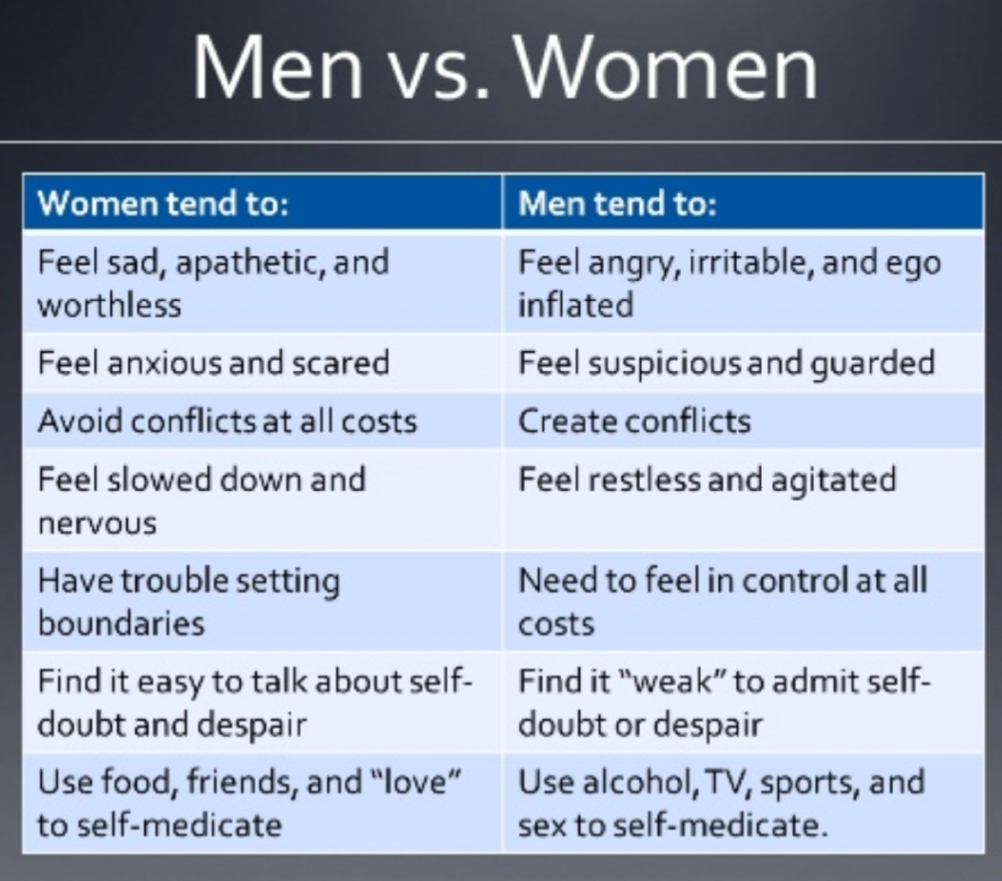Men & Depression
 What is depression?
What is depression?
Click the link below for more information about depression:
https://www.spacecounseling.com/Depression.en.html
As I mentioned earlier, men experience depression differently than women. The following are some examples of signs or symptoms for men to consider:

Men and women both experience depression, but their symptoms may be different. Men may display anger or aggressive behavior, instead of being sad and withdrawn. Family, friends, and even medical professionals may not see these symptoms as depressive symptoms; and let’s be honest, even if they did and told the man so, most likely he would deny it and not seek treatment for it. Men may attribute it to some external factor like problems at work or financial stress, therefore they won’t readily accept they need to talk with someone for depression.
Depression is a common but serious mood disorder that affects the ability to feel, think, and handle daily activities. Clinical or major depressive disorder must have symptoms present for 2 weeks to confirm the diagnosis.
Click the link below for more information about depression:
https://www.spacecounseling.com/Depression.en.html
As I mentioned earlier, men experience depression differently than women. The following are some examples of signs or symptoms for men to consider:
- Escapist behavior, such as spending a lot of time at work or on sports
- Irritability or inappropriate anger
- Controlling or violent or abusive behavior
- Risky or reckless behavior like excessive speeding or disobeying traffic laws, road rage, etc.
- Alcohol and/or drug abuse
- Common depressive symptoms: feeling sad, hopeless, empty, feeling extremely tired, difficulty sleeping, little to no pleasure in activities
- Focusing on more physiological symptoms like headaches, digestive problems, tiredness, long-term pain issues, etc.
- Downplaying these signs and symptoms, making some other excuses as reasons for the way they feel, externalizing emotional pain
- Reluctance to discussing depressive symptoms (difficulty trusting to open up)
- Resistance to mental health treatment (stigma-men don’t ask for help)
Whether you seek treatment or not, men should be honest with themselves about how they are feeling or what they are thinking. Sometimes it is difficult to accept that you are not feeling as well as you would like, and may be embarrassed to say something to someone. The following are some coping skills to consider while you are sorting out these thoughts and feelings:
- Set realistic goals and prioritize. Know your limits and do not go past them. When you are feeling overwhelmed, usually it is because you have taken on more than you can handle. It’s not macho to pile everything on and take care of things yourself--it’s foolish! Identify the top 3 things that need to be addressed and ONLY focus on those three things. Once you have a better handle on them, you can address other issues on your list.
- Seek out emotional support. You would be surprised who your support network is; all you have to do is ask. Reach out to someone you do trust and mention to them that you are having a difficult time, and would they mind if you vented to them. Who knows, it may really help, and next time you will be the one they come to!! More people relate to what you are going through then not, so reach out to someone.
- Learn ways to alleviate stress. This is extremely important, often times the depressive symptoms you are experiencing are the result of significant unaddressed stress. Massage, meditation, yoga, physical activity like sports or weight lifting, progressive relaxation exercises, etc. are some stress relieving activities to consider.
- Live healthy lifestyle. This encompasses many different areas like proper diet and nutrition, regular exercise, adequate sleep, socialization with people who are positive influences (and not those who are steeped in negativity), etc.
Men have been sex-stereotyped to be the “strong silent type”: don’t express feelings, tough it out, be self-confident and aggressive, “fix things”, physically imposing, sexually experienced, driven. These societal and cultural norms create rigid beliefs about masculinity that are misguided and maladaptive to modern day living. This creates undue pressure not only for the men but for the women who have to deal with them!! If more men would be honest and open about their feelings (and be willing to address them), there would be significantly less conflict and significantly more understanding.
Comments
Post a Comment